Legal Analysis: United States v. Blondek, Tull, Castle, and Lowry Case
VerifiedAdded on 2022/11/13
|9
|2494
|280
Report
AI Summary
This report provides a comprehensive analysis of the United States v. Blondek, Tull, Castle, and Lowry case, focusing on the Foreign Corrupt Practices Act (FCPA). The case involved charges of conspiracy to violate the FCPA, specifically concerning bribery of foreign officials. The report details the facts, legal issues, arguments presented by the defendants and the government, and the court's decision. The court ultimately ruled that foreign officials could not be prosecuted under the general conspiracy statute, upholding the intention of Congress to exclude them from prosecution under the FCPA. The analysis delves into the court's reasoning, including its reliance on the Gebardi precedent and the interpretation of legislative history. The report also considers the implications of the decision and its impact on the prosecution of bribery cases involving foreign officials.
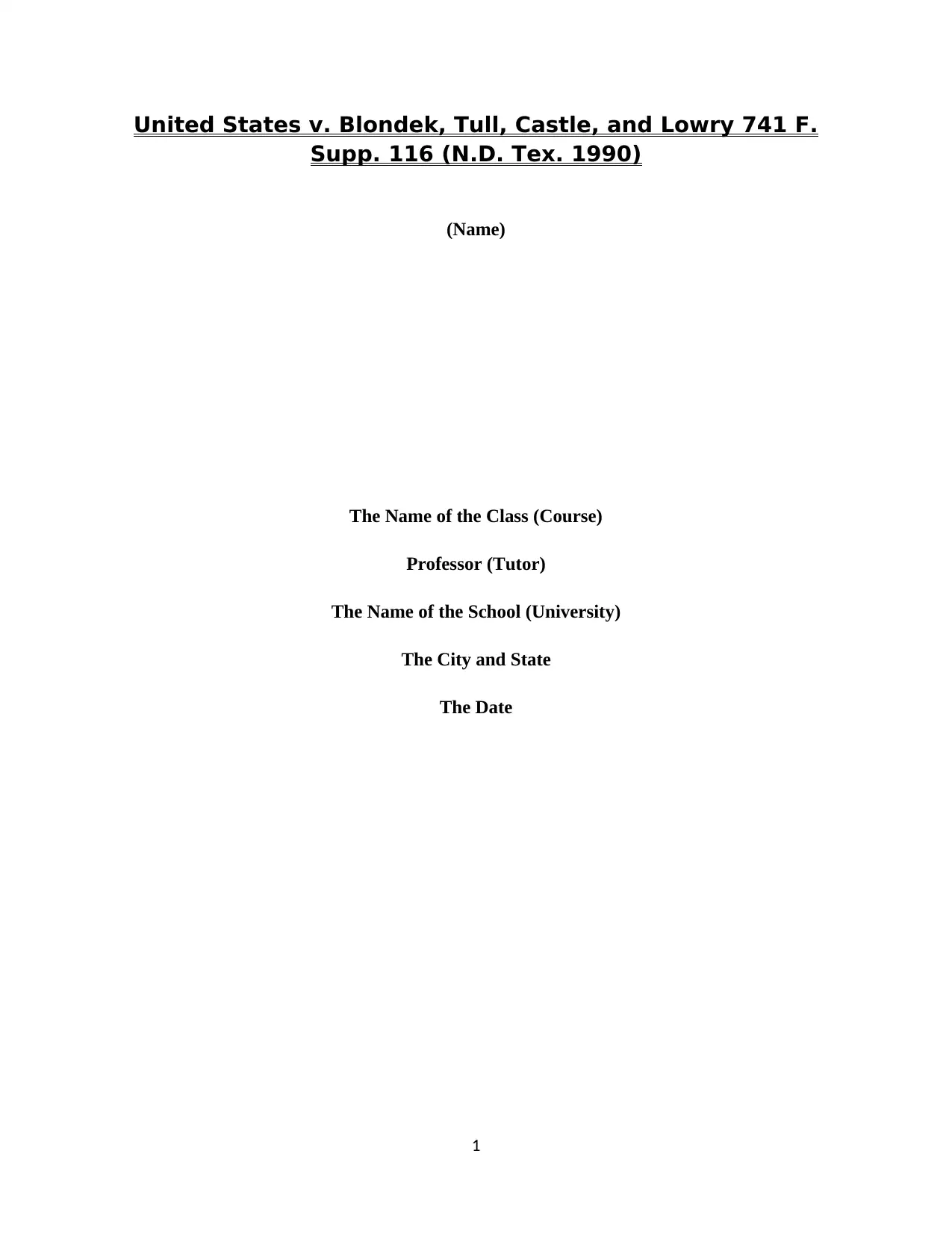
United States v. Blondek, Tull, Castle, and Lowry 741 F.
Supp. 116 (N.D. Tex. 1990)
(Name)
The Name of the Class (Course)
Professor (Tutor)
The Name of the School (University)
The City and State
The Date
1
Supp. 116 (N.D. Tex. 1990)
(Name)
The Name of the Class (Course)
Professor (Tutor)
The Name of the School (University)
The City and State
The Date
1
Paraphrase This Document
Need a fresh take? Get an instant paraphrase of this document with our AI Paraphraser
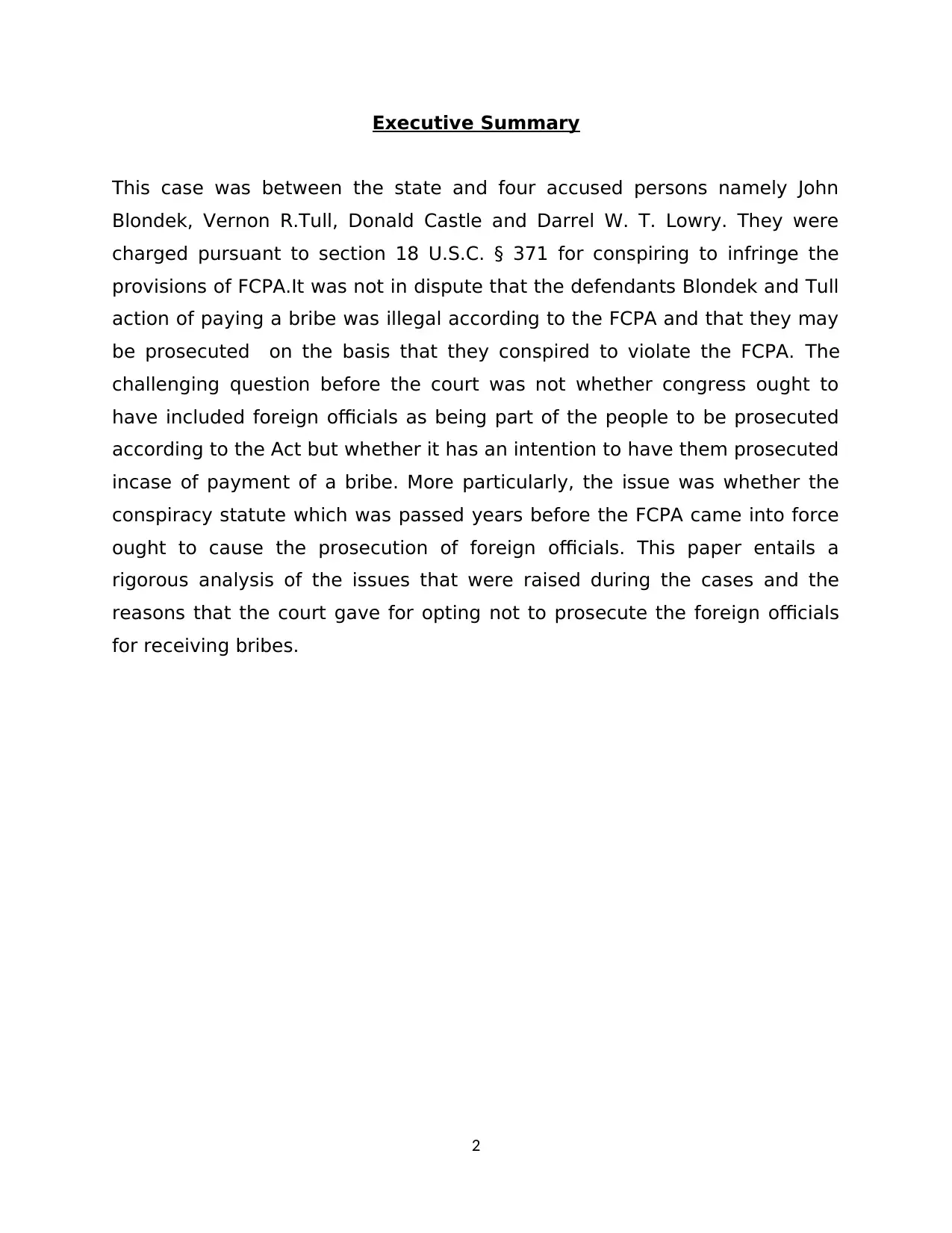
Executive Summary
This case was between the state and four accused persons namely John
Blondek, Vernon R.Tull, Donald Castle and Darrel W. T. Lowry. They were
charged pursuant to section 18 U.S.C. § 371 for conspiring to infringe the
provisions of FCPA.It was not in dispute that the defendants Blondek and Tull
action of paying a bribe was illegal according to the FCPA and that they may
be prosecuted on the basis that they conspired to violate the FCPA. The
challenging question before the court was not whether congress ought to
have included foreign officials as being part of the people to be prosecuted
according to the Act but whether it has an intention to have them prosecuted
incase of payment of a bribe. More particularly, the issue was whether the
conspiracy statute which was passed years before the FCPA came into force
ought to cause the prosecution of foreign officials. This paper entails a
rigorous analysis of the issues that were raised during the cases and the
reasons that the court gave for opting not to prosecute the foreign officials
for receiving bribes.
2
This case was between the state and four accused persons namely John
Blondek, Vernon R.Tull, Donald Castle and Darrel W. T. Lowry. They were
charged pursuant to section 18 U.S.C. § 371 for conspiring to infringe the
provisions of FCPA.It was not in dispute that the defendants Blondek and Tull
action of paying a bribe was illegal according to the FCPA and that they may
be prosecuted on the basis that they conspired to violate the FCPA. The
challenging question before the court was not whether congress ought to
have included foreign officials as being part of the people to be prosecuted
according to the Act but whether it has an intention to have them prosecuted
incase of payment of a bribe. More particularly, the issue was whether the
conspiracy statute which was passed years before the FCPA came into force
ought to cause the prosecution of foreign officials. This paper entails a
rigorous analysis of the issues that were raised during the cases and the
reasons that the court gave for opting not to prosecute the foreign officials
for receiving bribes.
2
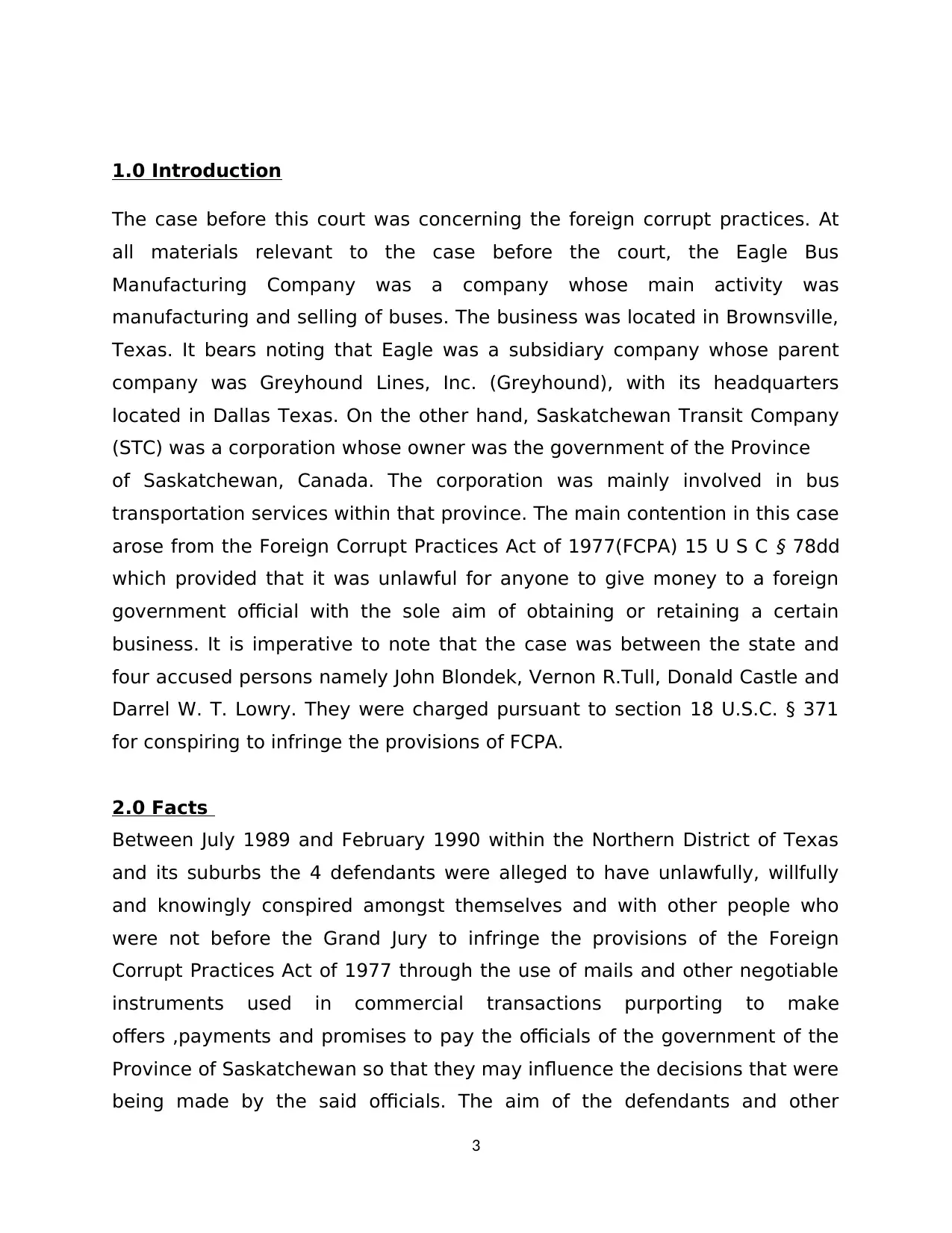
1.0 Introduction
The case before this court was concerning the foreign corrupt practices. At
all materials relevant to the case before the court, the Eagle Bus
Manufacturing Company was a company whose main activity was
manufacturing and selling of buses. The business was located in Brownsville,
Texas. It bears noting that Eagle was a subsidiary company whose parent
company was Greyhound Lines, Inc. (Greyhound), with its headquarters
located in Dallas Texas. On the other hand, Saskatchewan Transit Company
(STC) was a corporation whose owner was the government of the Province
of Saskatchewan, Canada. The corporation was mainly involved in bus
transportation services within that province. The main contention in this case
arose from the Foreign Corrupt Practices Act of 1977(FCPA) 15 U S C § 78dd
which provided that it was unlawful for anyone to give money to a foreign
government official with the sole aim of obtaining or retaining a certain
business. It is imperative to note that the case was between the state and
four accused persons namely John Blondek, Vernon R.Tull, Donald Castle and
Darrel W. T. Lowry. They were charged pursuant to section 18 U.S.C. § 371
for conspiring to infringe the provisions of FCPA.
2.0 Facts
Between July 1989 and February 1990 within the Northern District of Texas
and its suburbs the 4 defendants were alleged to have unlawfully, willfully
and knowingly conspired amongst themselves and with other people who
were not before the Grand Jury to infringe the provisions of the Foreign
Corrupt Practices Act of 1977 through the use of mails and other negotiable
instruments used in commercial transactions purporting to make
offers ,payments and promises to pay the officials of the government of the
Province of Saskatchewan so that they may influence the decisions that were
being made by the said officials. The aim of the defendants and other
3
The case before this court was concerning the foreign corrupt practices. At
all materials relevant to the case before the court, the Eagle Bus
Manufacturing Company was a company whose main activity was
manufacturing and selling of buses. The business was located in Brownsville,
Texas. It bears noting that Eagle was a subsidiary company whose parent
company was Greyhound Lines, Inc. (Greyhound), with its headquarters
located in Dallas Texas. On the other hand, Saskatchewan Transit Company
(STC) was a corporation whose owner was the government of the Province
of Saskatchewan, Canada. The corporation was mainly involved in bus
transportation services within that province. The main contention in this case
arose from the Foreign Corrupt Practices Act of 1977(FCPA) 15 U S C § 78dd
which provided that it was unlawful for anyone to give money to a foreign
government official with the sole aim of obtaining or retaining a certain
business. It is imperative to note that the case was between the state and
four accused persons namely John Blondek, Vernon R.Tull, Donald Castle and
Darrel W. T. Lowry. They were charged pursuant to section 18 U.S.C. § 371
for conspiring to infringe the provisions of FCPA.
2.0 Facts
Between July 1989 and February 1990 within the Northern District of Texas
and its suburbs the 4 defendants were alleged to have unlawfully, willfully
and knowingly conspired amongst themselves and with other people who
were not before the Grand Jury to infringe the provisions of the Foreign
Corrupt Practices Act of 1977 through the use of mails and other negotiable
instruments used in commercial transactions purporting to make
offers ,payments and promises to pay the officials of the government of the
Province of Saskatchewan so that they may influence the decisions that were
being made by the said officials. The aim of the defendants and other
3
⊘ This is a preview!⊘
Do you want full access?
Subscribe today to unlock all pages.

Trusted by 1+ million students worldwide
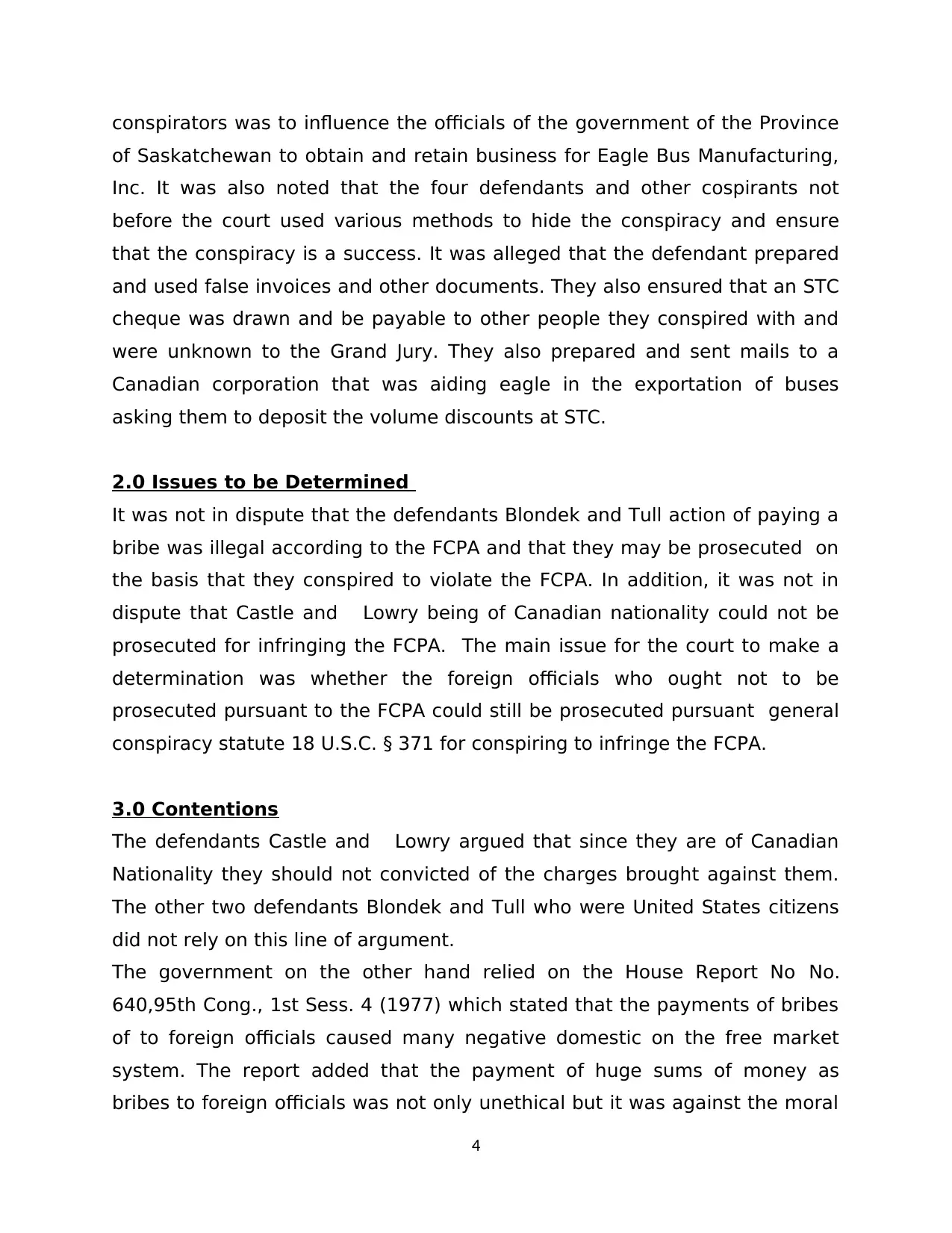
conspirators was to influence the officials of the government of the Province
of Saskatchewan to obtain and retain business for Eagle Bus Manufacturing,
Inc. It was also noted that the four defendants and other cospirants not
before the court used various methods to hide the conspiracy and ensure
that the conspiracy is a success. It was alleged that the defendant prepared
and used false invoices and other documents. They also ensured that an STC
cheque was drawn and be payable to other people they conspired with and
were unknown to the Grand Jury. They also prepared and sent mails to a
Canadian corporation that was aiding eagle in the exportation of buses
asking them to deposit the volume discounts at STC.
2.0 Issues to be Determined
It was not in dispute that the defendants Blondek and Tull action of paying a
bribe was illegal according to the FCPA and that they may be prosecuted on
the basis that they conspired to violate the FCPA. In addition, it was not in
dispute that Castle and Lowry being of Canadian nationality could not be
prosecuted for infringing the FCPA. The main issue for the court to make a
determination was whether the foreign officials who ought not to be
prosecuted pursuant to the FCPA could still be prosecuted pursuant general
conspiracy statute 18 U.S.C. § 371 for conspiring to infringe the FCPA.
3.0 Contentions
The defendants Castle and Lowry argued that since they are of Canadian
Nationality they should not convicted of the charges brought against them.
The other two defendants Blondek and Tull who were United States citizens
did not rely on this line of argument.
The government on the other hand relied on the House Report No No.
640,95th Cong., 1st Sess. 4 (1977) which stated that the payments of bribes
of to foreign officials caused many negative domestic on the free market
system. The report added that the payment of huge sums of money as
bribes to foreign officials was not only unethical but it was against the moral
4
of Saskatchewan to obtain and retain business for Eagle Bus Manufacturing,
Inc. It was also noted that the four defendants and other cospirants not
before the court used various methods to hide the conspiracy and ensure
that the conspiracy is a success. It was alleged that the defendant prepared
and used false invoices and other documents. They also ensured that an STC
cheque was drawn and be payable to other people they conspired with and
were unknown to the Grand Jury. They also prepared and sent mails to a
Canadian corporation that was aiding eagle in the exportation of buses
asking them to deposit the volume discounts at STC.
2.0 Issues to be Determined
It was not in dispute that the defendants Blondek and Tull action of paying a
bribe was illegal according to the FCPA and that they may be prosecuted on
the basis that they conspired to violate the FCPA. In addition, it was not in
dispute that Castle and Lowry being of Canadian nationality could not be
prosecuted for infringing the FCPA. The main issue for the court to make a
determination was whether the foreign officials who ought not to be
prosecuted pursuant to the FCPA could still be prosecuted pursuant general
conspiracy statute 18 U.S.C. § 371 for conspiring to infringe the FCPA.
3.0 Contentions
The defendants Castle and Lowry argued that since they are of Canadian
Nationality they should not convicted of the charges brought against them.
The other two defendants Blondek and Tull who were United States citizens
did not rely on this line of argument.
The government on the other hand relied on the House Report No No.
640,95th Cong., 1st Sess. 4 (1977) which stated that the payments of bribes
of to foreign officials caused many negative domestic on the free market
system. The report added that the payment of huge sums of money as
bribes to foreign officials was not only unethical but it was against the moral
4
Paraphrase This Document
Need a fresh take? Get an instant paraphrase of this document with our AI Paraphraser
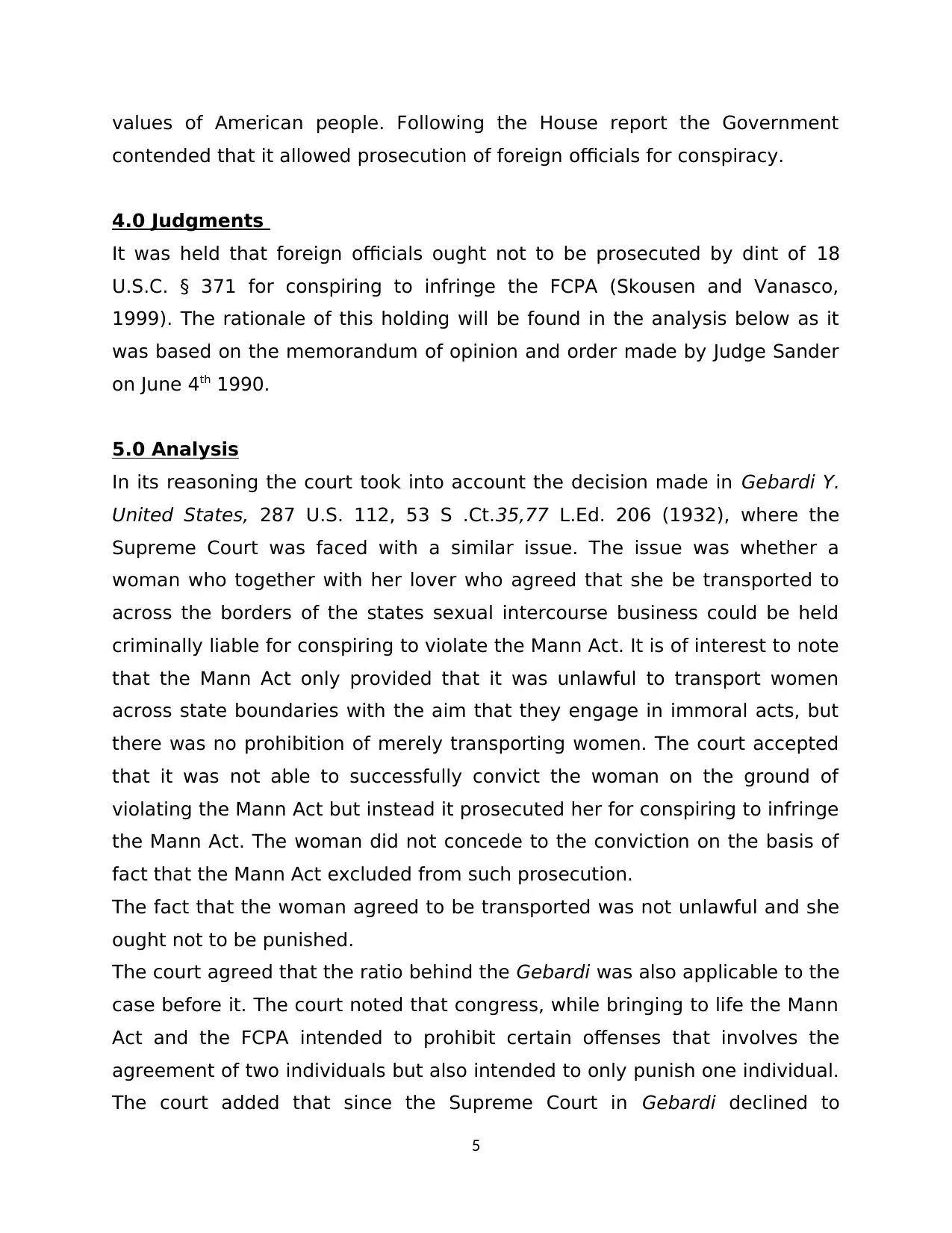
values of American people. Following the House report the Government
contended that it allowed prosecution of foreign officials for conspiracy.
4.0 Judgments
It was held that foreign officials ought not to be prosecuted by dint of 18
U.S.C. § 371 for conspiring to infringe the FCPA (Skousen and Vanasco,
1999). The rationale of this holding will be found in the analysis below as it
was based on the memorandum of opinion and order made by Judge Sander
on June 4th 1990.
5.0 Analysis
In its reasoning the court took into account the decision made in Gebardi Y.
United States, 287 U.S. 112, 53 S .Ct.35,77 L.Ed. 206 (1932), where the
Supreme Court was faced with a similar issue. The issue was whether a
woman who together with her lover who agreed that she be transported to
across the borders of the states sexual intercourse business could be held
criminally liable for conspiring to violate the Mann Act. It is of interest to note
that the Mann Act only provided that it was unlawful to transport women
across state boundaries with the aim that they engage in immoral acts, but
there was no prohibition of merely transporting women. The court accepted
that it was not able to successfully convict the woman on the ground of
violating the Mann Act but instead it prosecuted her for conspiring to infringe
the Mann Act. The woman did not concede to the conviction on the basis of
fact that the Mann Act excluded from such prosecution.
The fact that the woman agreed to be transported was not unlawful and she
ought not to be punished.
The court agreed that the ratio behind the Gebardi was also applicable to the
case before it. The court noted that congress, while bringing to life the Mann
Act and the FCPA intended to prohibit certain offenses that involves the
agreement of two individuals but also intended to only punish one individual.
The court added that since the Supreme Court in Gebardi declined to
5
contended that it allowed prosecution of foreign officials for conspiracy.
4.0 Judgments
It was held that foreign officials ought not to be prosecuted by dint of 18
U.S.C. § 371 for conspiring to infringe the FCPA (Skousen and Vanasco,
1999). The rationale of this holding will be found in the analysis below as it
was based on the memorandum of opinion and order made by Judge Sander
on June 4th 1990.
5.0 Analysis
In its reasoning the court took into account the decision made in Gebardi Y.
United States, 287 U.S. 112, 53 S .Ct.35,77 L.Ed. 206 (1932), where the
Supreme Court was faced with a similar issue. The issue was whether a
woman who together with her lover who agreed that she be transported to
across the borders of the states sexual intercourse business could be held
criminally liable for conspiring to violate the Mann Act. It is of interest to note
that the Mann Act only provided that it was unlawful to transport women
across state boundaries with the aim that they engage in immoral acts, but
there was no prohibition of merely transporting women. The court accepted
that it was not able to successfully convict the woman on the ground of
violating the Mann Act but instead it prosecuted her for conspiring to infringe
the Mann Act. The woman did not concede to the conviction on the basis of
fact that the Mann Act excluded from such prosecution.
The fact that the woman agreed to be transported was not unlawful and she
ought not to be punished.
The court agreed that the ratio behind the Gebardi was also applicable to the
case before it. The court noted that congress, while bringing to life the Mann
Act and the FCPA intended to prohibit certain offenses that involves the
agreement of two individuals but also intended to only punish one individual.
The court added that since the Supreme Court in Gebardi declined to
5
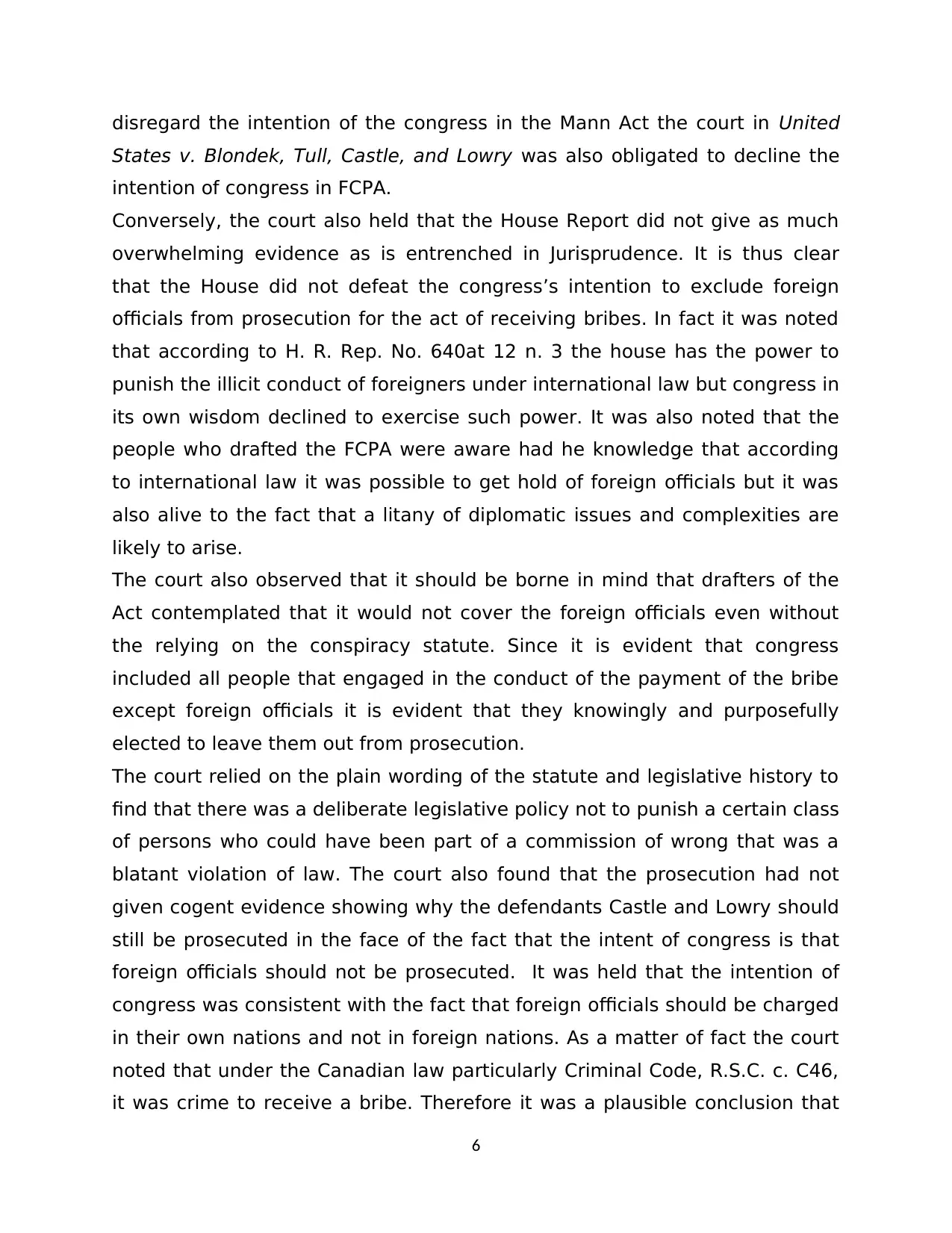
disregard the intention of the congress in the Mann Act the court in United
States v. Blondek, Tull, Castle, and Lowry was also obligated to decline the
intention of congress in FCPA.
Conversely, the court also held that the House Report did not give as much
overwhelming evidence as is entrenched in Jurisprudence. It is thus clear
that the House did not defeat the congress’s intention to exclude foreign
officials from prosecution for the act of receiving bribes. In fact it was noted
that according to H. R. Rep. No. 640at 12 n. 3 the house has the power to
punish the illicit conduct of foreigners under international law but congress in
its own wisdom declined to exercise such power. It was also noted that the
people who drafted the FCPA were aware had he knowledge that according
to international law it was possible to get hold of foreign officials but it was
also alive to the fact that a litany of diplomatic issues and complexities are
likely to arise.
The court also observed that it should be borne in mind that drafters of the
Act contemplated that it would not cover the foreign officials even without
the relying on the conspiracy statute. Since it is evident that congress
included all people that engaged in the conduct of the payment of the bribe
except foreign officials it is evident that they knowingly and purposefully
elected to leave them out from prosecution.
The court relied on the plain wording of the statute and legislative history to
find that there was a deliberate legislative policy not to punish a certain class
of persons who could have been part of a commission of wrong that was a
blatant violation of law. The court also found that the prosecution had not
given cogent evidence showing why the defendants Castle and Lowry should
still be prosecuted in the face of the fact that the intent of congress is that
foreign officials should not be prosecuted. It was held that the intention of
congress was consistent with the fact that foreign officials should be charged
in their own nations and not in foreign nations. As a matter of fact the court
noted that under the Canadian law particularly Criminal Code, R.S.C. c. C46,
it was crime to receive a bribe. Therefore it was a plausible conclusion that
6
States v. Blondek, Tull, Castle, and Lowry was also obligated to decline the
intention of congress in FCPA.
Conversely, the court also held that the House Report did not give as much
overwhelming evidence as is entrenched in Jurisprudence. It is thus clear
that the House did not defeat the congress’s intention to exclude foreign
officials from prosecution for the act of receiving bribes. In fact it was noted
that according to H. R. Rep. No. 640at 12 n. 3 the house has the power to
punish the illicit conduct of foreigners under international law but congress in
its own wisdom declined to exercise such power. It was also noted that the
people who drafted the FCPA were aware had he knowledge that according
to international law it was possible to get hold of foreign officials but it was
also alive to the fact that a litany of diplomatic issues and complexities are
likely to arise.
The court also observed that it should be borne in mind that drafters of the
Act contemplated that it would not cover the foreign officials even without
the relying on the conspiracy statute. Since it is evident that congress
included all people that engaged in the conduct of the payment of the bribe
except foreign officials it is evident that they knowingly and purposefully
elected to leave them out from prosecution.
The court relied on the plain wording of the statute and legislative history to
find that there was a deliberate legislative policy not to punish a certain class
of persons who could have been part of a commission of wrong that was a
blatant violation of law. The court also found that the prosecution had not
given cogent evidence showing why the defendants Castle and Lowry should
still be prosecuted in the face of the fact that the intent of congress is that
foreign officials should not be prosecuted. It was held that the intention of
congress was consistent with the fact that foreign officials should be charged
in their own nations and not in foreign nations. As a matter of fact the court
noted that under the Canadian law particularly Criminal Code, R.S.C. c. C46,
it was crime to receive a bribe. Therefore it was a plausible conclusion that
6
⊘ This is a preview!⊘
Do you want full access?
Subscribe today to unlock all pages.

Trusted by 1+ million students worldwide
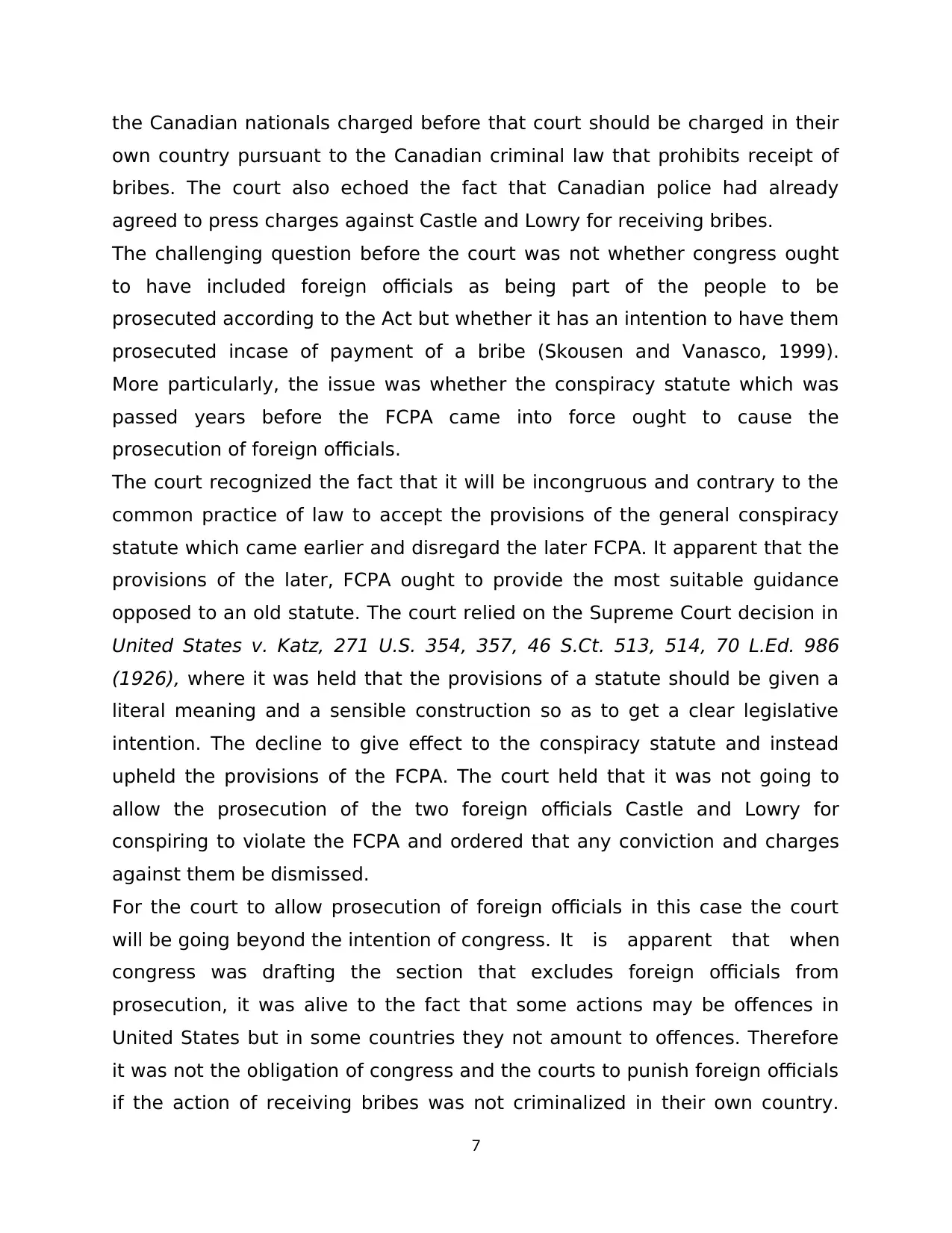
the Canadian nationals charged before that court should be charged in their
own country pursuant to the Canadian criminal law that prohibits receipt of
bribes. The court also echoed the fact that Canadian police had already
agreed to press charges against Castle and Lowry for receiving bribes.
The challenging question before the court was not whether congress ought
to have included foreign officials as being part of the people to be
prosecuted according to the Act but whether it has an intention to have them
prosecuted incase of payment of a bribe (Skousen and Vanasco, 1999).
More particularly, the issue was whether the conspiracy statute which was
passed years before the FCPA came into force ought to cause the
prosecution of foreign officials.
The court recognized the fact that it will be incongruous and contrary to the
common practice of law to accept the provisions of the general conspiracy
statute which came earlier and disregard the later FCPA. It apparent that the
provisions of the later, FCPA ought to provide the most suitable guidance
opposed to an old statute. The court relied on the Supreme Court decision in
United States v. Katz, 271 U.S. 354, 357, 46 S.Ct. 513, 514, 70 L.Ed. 986
(1926), where it was held that the provisions of a statute should be given a
literal meaning and a sensible construction so as to get a clear legislative
intention. The decline to give effect to the conspiracy statute and instead
upheld the provisions of the FCPA. The court held that it was not going to
allow the prosecution of the two foreign officials Castle and Lowry for
conspiring to violate the FCPA and ordered that any conviction and charges
against them be dismissed.
For the court to allow prosecution of foreign officials in this case the court
will be going beyond the intention of congress. It is apparent that when
congress was drafting the section that excludes foreign officials from
prosecution, it was alive to the fact that some actions may be offences in
United States but in some countries they not amount to offences. Therefore
it was not the obligation of congress and the courts to punish foreign officials
if the action of receiving bribes was not criminalized in their own country.
7
own country pursuant to the Canadian criminal law that prohibits receipt of
bribes. The court also echoed the fact that Canadian police had already
agreed to press charges against Castle and Lowry for receiving bribes.
The challenging question before the court was not whether congress ought
to have included foreign officials as being part of the people to be
prosecuted according to the Act but whether it has an intention to have them
prosecuted incase of payment of a bribe (Skousen and Vanasco, 1999).
More particularly, the issue was whether the conspiracy statute which was
passed years before the FCPA came into force ought to cause the
prosecution of foreign officials.
The court recognized the fact that it will be incongruous and contrary to the
common practice of law to accept the provisions of the general conspiracy
statute which came earlier and disregard the later FCPA. It apparent that the
provisions of the later, FCPA ought to provide the most suitable guidance
opposed to an old statute. The court relied on the Supreme Court decision in
United States v. Katz, 271 U.S. 354, 357, 46 S.Ct. 513, 514, 70 L.Ed. 986
(1926), where it was held that the provisions of a statute should be given a
literal meaning and a sensible construction so as to get a clear legislative
intention. The decline to give effect to the conspiracy statute and instead
upheld the provisions of the FCPA. The court held that it was not going to
allow the prosecution of the two foreign officials Castle and Lowry for
conspiring to violate the FCPA and ordered that any conviction and charges
against them be dismissed.
For the court to allow prosecution of foreign officials in this case the court
will be going beyond the intention of congress. It is apparent that when
congress was drafting the section that excludes foreign officials from
prosecution, it was alive to the fact that some actions may be offences in
United States but in some countries they not amount to offences. Therefore
it was not the obligation of congress and the courts to punish foreign officials
if the action of receiving bribes was not criminalized in their own country.
7
Paraphrase This Document
Need a fresh take? Get an instant paraphrase of this document with our AI Paraphraser
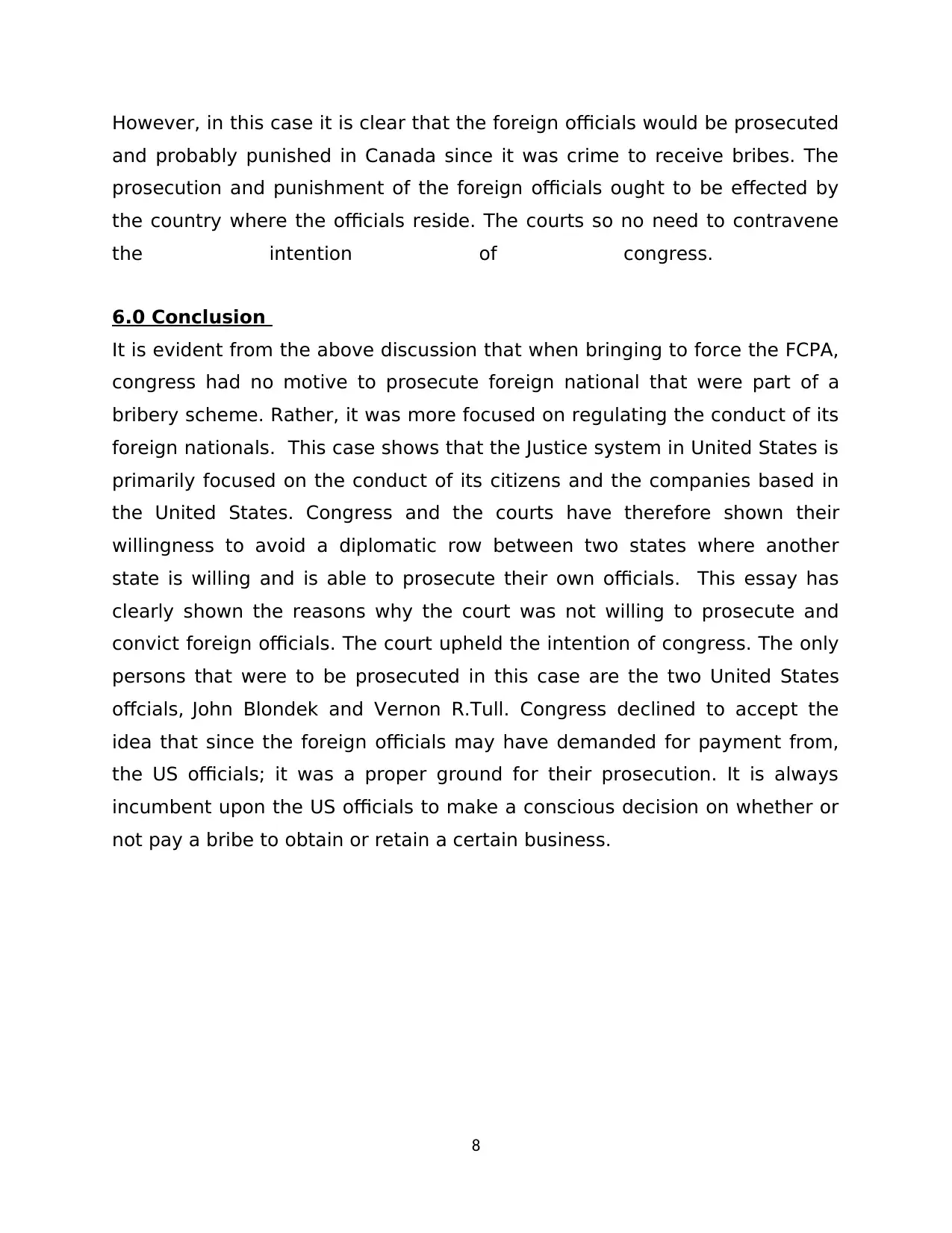
However, in this case it is clear that the foreign officials would be prosecuted
and probably punished in Canada since it was crime to receive bribes. The
prosecution and punishment of the foreign officials ought to be effected by
the country where the officials reside. The courts so no need to contravene
the intention of congress.
6.0 Conclusion
It is evident from the above discussion that when bringing to force the FCPA,
congress had no motive to prosecute foreign national that were part of a
bribery scheme. Rather, it was more focused on regulating the conduct of its
foreign nationals. This case shows that the Justice system in United States is
primarily focused on the conduct of its citizens and the companies based in
the United States. Congress and the courts have therefore shown their
willingness to avoid a diplomatic row between two states where another
state is willing and is able to prosecute their own officials. This essay has
clearly shown the reasons why the court was not willing to prosecute and
convict foreign officials. The court upheld the intention of congress. The only
persons that were to be prosecuted in this case are the two United States
offcials, John Blondek and Vernon R.Tull. Congress declined to accept the
idea that since the foreign officials may have demanded for payment from,
the US officials; it was a proper ground for their prosecution. It is always
incumbent upon the US officials to make a conscious decision on whether or
not pay a bribe to obtain or retain a certain business.
8
and probably punished in Canada since it was crime to receive bribes. The
prosecution and punishment of the foreign officials ought to be effected by
the country where the officials reside. The courts so no need to contravene
the intention of congress.
6.0 Conclusion
It is evident from the above discussion that when bringing to force the FCPA,
congress had no motive to prosecute foreign national that were part of a
bribery scheme. Rather, it was more focused on regulating the conduct of its
foreign nationals. This case shows that the Justice system in United States is
primarily focused on the conduct of its citizens and the companies based in
the United States. Congress and the courts have therefore shown their
willingness to avoid a diplomatic row between two states where another
state is willing and is able to prosecute their own officials. This essay has
clearly shown the reasons why the court was not willing to prosecute and
convict foreign officials. The court upheld the intention of congress. The only
persons that were to be prosecuted in this case are the two United States
offcials, John Blondek and Vernon R.Tull. Congress declined to accept the
idea that since the foreign officials may have demanded for payment from,
the US officials; it was a proper ground for their prosecution. It is always
incumbent upon the US officials to make a conscious decision on whether or
not pay a bribe to obtain or retain a certain business.
8
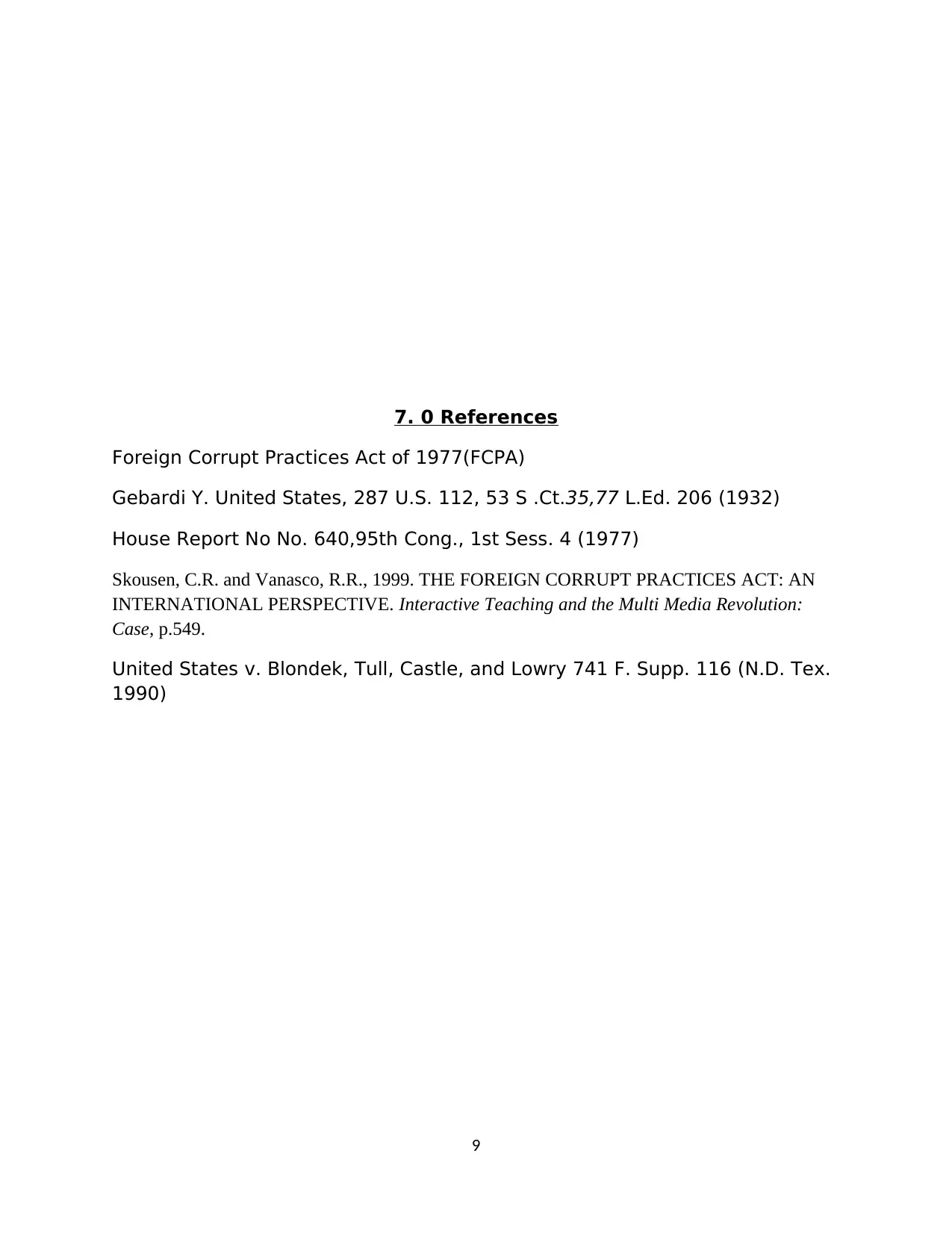
7. 0 References
Foreign Corrupt Practices Act of 1977(FCPA)
Gebardi Y. United States, 287 U.S. 112, 53 S .Ct.35,77 L.Ed. 206 (1932)
House Report No No. 640,95th Cong., 1st Sess. 4 (1977)
Skousen, C.R. and Vanasco, R.R., 1999. THE FOREIGN CORRUPT PRACTICES ACT: AN
INTERNATIONAL PERSPECTIVE. Interactive Teaching and the Multi Media Revolution:
Case, p.549.
United States v. Blondek, Tull, Castle, and Lowry 741 F. Supp. 116 (N.D. Tex.
1990)
9
Foreign Corrupt Practices Act of 1977(FCPA)
Gebardi Y. United States, 287 U.S. 112, 53 S .Ct.35,77 L.Ed. 206 (1932)
House Report No No. 640,95th Cong., 1st Sess. 4 (1977)
Skousen, C.R. and Vanasco, R.R., 1999. THE FOREIGN CORRUPT PRACTICES ACT: AN
INTERNATIONAL PERSPECTIVE. Interactive Teaching and the Multi Media Revolution:
Case, p.549.
United States v. Blondek, Tull, Castle, and Lowry 741 F. Supp. 116 (N.D. Tex.
1990)
9
⊘ This is a preview!⊘
Do you want full access?
Subscribe today to unlock all pages.

Trusted by 1+ million students worldwide
1 out of 9
Your All-in-One AI-Powered Toolkit for Academic Success.
+13062052269
info@desklib.com
Available 24*7 on WhatsApp / Email
![[object Object]](/_next/static/media/star-bottom.7253800d.svg)
Unlock your academic potential
Copyright © 2020–2025 A2Z Services. All Rights Reserved. Developed and managed by ZUCOL.

